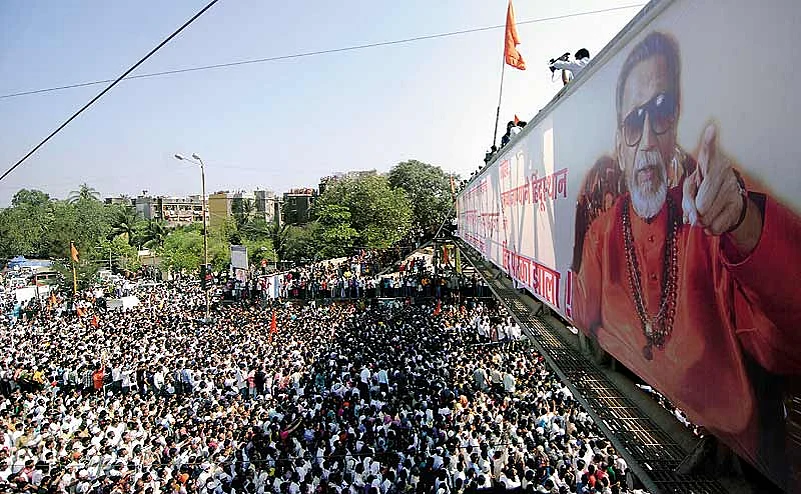It is not my job to pay tributes to dead politicians, nor is it to do a hatchet job on them. I have learnt to look at human beings without being terribly judgemental, since I still retain something of my clinical training. Therefore, I shall look at Bal Thackeray from a distance. He was a product of a period of Indian politics during which his kind thrived. It was the time when leaders like Datta Samant emerged but, unlike him, Thackeray’s instinct for survival was stronger and he negotiated the world of Indian politics with greater skill despite his—and this is a gross understatement—many angularities.
Prance Of The Trickster
Bal Thackeray played a game of violent juvenile pranks as politics

Actually, Thackeray believed in nothing. Many people think he believed in Hindutva, something that he exploited very successfully to further his career, but it perhaps did not mean anything at all to him. He spewed hatred against Hindus liberally—and frequently. When they were not the south Indians, they were the Gujaratis and the Marwaris and, later in his life, the migrants from UP and Bihar. It would be wrong to presume that Balasaheb spoke for the Hindus; he only spoke up for those who supported him. Chameleon-like, he changed colours and always looked ready for different occasions. It is being said that he cemented Marathi identity, but even that is doubtful. Marathi identity was something already there; it did not have to be reinforced by Thackeray. Balasaheb only took advantage of its existence and rode its crest to political power.
The glowing tributes that have poured in for Thackeray are not easy to explain at short notice. We shall have to wait to assess their resilience. Indians avoid speaking ill of the dead. A careful enumeration might reveal some day that Thackeray’s victims among the Marathi people, for whom he reportedly toiled all his life, were more numerous than Ajmal Kasab’s (whose hanging has prompted not lamentation, but jubilation). It is probable that Thackeray’s legacy of violence has been overlooked as most of his victims have come from the bottom strata of society, whose deaths do not make much of a difference to a media-exposed public.
After saying all this, I must hasten to add that there is in Thackeray another trait that may explain the eulogies he has received from various quarters. One can accuse him of having run a criminal enterprise, but the political culture of it did not seem criminal because there was an element of juvenile delinquency in it. The use of the term juvenile is deliberate; there was something innocent about his project, something that reminded one of the playfulness of a teenager. What would have otherwise looked like a criminal enterprise ended up looking like the forgiveable naughtiness of a teenager. For many, he was always playing a game, he made it clear to his galaxy of friends and followers, in Mario Puzo style.
In him, there was a little bit of playacting. Not surprisingly, his circle of friends included people from different religious, educational and linguistic backgrounds. Not only that, they even included those who opposed every canon of the different ideologies he has espoused in his entire political life. How else can one explain the friendship between R.K. Laxman, a classical liberal (and a south Indian!), and Thackeray? He reportedly even called him up days before he died just so that he could hear his voice once. Their relationship was described as ‘apolitical’, and it endorses what I said.
This is why I say he believed in nothing. There was something iconoclastic about him. He cared two hoots for ideologies. He saw through the hypocrisy of ideologies that political leaders employ on the national scene. For him, politics was just a game and he beat others at it. He didn’t even take himself as seriously as many would like to believe. People who knew him reasonably well probably suspected in their hearts that he never believed in any of what he said publicly. I think their tributes discounted the element of violence, given that there was something juvenile about his political enterprise. They would rather remember it as something slightly naughty.















